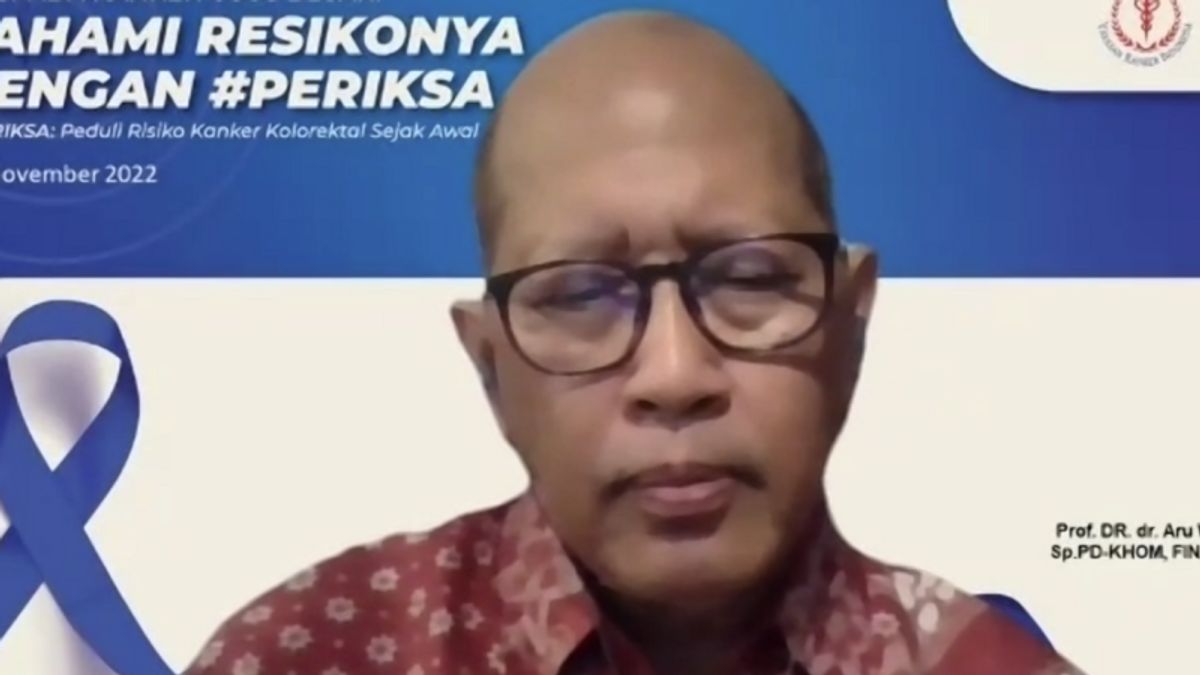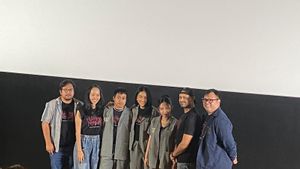JAKARTA - Chairman of the Indonesian Cancer Foundation (YKI) Prof. Dr. dr. Aru Sudoyo, Sp.PD-KHOM, FINASIM, FACP suggested that people carry out routine screening at least once a year to detect the risk of colon cancer or colorectal cancer.
"Actually, what we can do today is screened for dirt. Check your dirt once a year," Aru said in a webinar “ Watch out for Large Excise Cancer ” which was followed virtually in Jakarta, Antara, Wednesday, November 30.
The examination is said to be a blood test in feces or faint blood fess that can be done in the laboratory. Aru explained that this examination only requires a small number of fess samples stored in the container before being submitted to the laboratory.
He said this type of examination was the cheapest screening of colon cancer among several other methods. But the obstacle, said Aru, is that patients often feel reluctant to bring samples of feces because they feel disgusted.
“ I could ask my patients to spend millions of rupiah for blood tests, but once he had to take his dirt to the laboratory, he didn't want to, DISgusted and so on. As a result, screening failed," he said.
Examination is recommended to be carried out once a year considering the development of normal cells into malignant cells takes quite a long time between 5 and 20 years. Given this long time, said Aru, there is no reason for the public not to do early detection.
The fessation examination is recommended to be carried out on someone aged 35-40 years. In addition, in someone who is 45-50 years old, Aru suggested that a more accurate collonoscopy examination should be carried out than a fessical examination.
“ For those who can afford it, then at the age of 50 it is no later than (colonoscopic examination). Although I suggest 45 years, yes. Already have to undergo colonoscopic examination or colon endoscopy from below, which will be repeated every 10 years or 15 years,” said Aru.
When compared, the fessation examination is more practical and easy and cheap, while colonoscopic requires preparation and expensive with a more accurate excess of results.
Another comparison, fess audits are useful for reducing mortality rates widely, while colonoscopy reduces the death rate per person. Fessation examinations are often false positives and detected tumors are often a bit large, while colonoscopy takes time and must be done in hospital.
“ (Fese examination) is often a false positive. Often he is positive but there is no tumor, especially if we just eat red meat. And when we get blood in the dirt, it means the tumor is a bit big, so we can't really get (tumor) in a very small state,” said Aru.
Compared to other cancer screenings, Aru said unfortunately until now in Indonesia there has been no colon cancer screening program in the sense of official movements. Given this, public or individual awareness is needed to take the initiative to independently screen colon cancer.
“ When asked if there is now a screening program? As big as the official movement does not exist. What exists now is the individual movement that every doctor is advised to urge his patients to undergo these examinations,” said Aru.
The English, Chinese, Japanese, Arabic, and French versions are automatically generated by the AI. So there may still be inaccuracies in translating, please always see Indonesian as our main language. (system supported by DigitalSiber.id)
Most Popular Tags
#Prabowo Subianto #golkar #Pilkada Dki #online gambling #Mount Lewotobi malePopular
22 November 2024, 01:33









